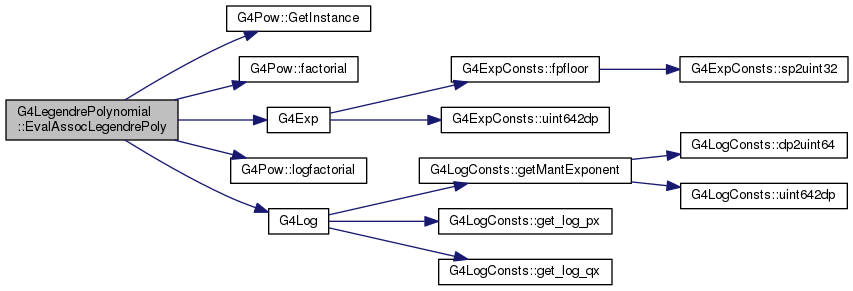#include <G4LegendrePolynomial.hh>
Definition at line 49 of file G4LegendrePolynomial.hh.
| void G4LegendrePolynomial::BuildUpToOrder |
( |
size_t |
order | ) |
|
|
protected |
Definition at line 102 of file G4LegendrePolynomial.cc.
105 G4cout <<
"G4LegendrePolynomial::GetCoefficient(): "
106 <<
"I refuse to make a Legendre Polynomial of order "
115 for(
size_t iCoeff = 0; iCoeff < order+1; ++iCoeff) {
116 if((order % 2) == (iCoeff % 2)) {
std::vector< std::vector< G4double > > fCoefficients
G4GLOB_DLL std::ostream G4cout
Definition at line 49 of file G4LegendrePolynomial.cc.
51 if(l<0 || m<-l || m>l)
return 0;
71 if(
m==0)
return 0.5*(3.*x2 - 1.);
72 if(
m==1)
return -3.*x*sqrt(1.-x2);
76 if(
m==0)
return 0.5*(5.*x*x2 - 3.*x);
77 if(
m==1)
return -1.5*(5.*x2-1.)*sqrt(1.-x2);
78 if(
m==2)
return 15.*x*(1.-x2);
79 return -15.*(1.-x2)*sqrt(1.-x2);
82 if(
m==0)
return 0.125*(35.*x2*x2 - 30.*x2 + 3.);
83 if(
m==1)
return -2.5*(7.*x*x2-3.*x)*sqrt(1.-x2);
84 if(
m==2)
return 7.5*(7.*x2-1.)*(1.-x2);
85 if(
m==3)
return -105.*x*(1.-x2)*sqrt(1.-x2);
86 return 105.*(1. - 2.*x2 + x2*x2);
92 if(
m==l)
return (l%2 ? -1. : 1.) *
static G4Pow * GetInstance()
static constexpr double m
G4double factorial(G4int Z) const
G4double G4Log(G4double x)
G4double G4Exp(G4double initial_x)
Exponential Function double precision.
G4double EvalAssocLegendrePoly(G4int l, G4int m, G4double x)
G4double logfactorial(G4int Z) const
| G4double G4LegendrePolynomial::GetCoefficient |
( |
size_t |
i, |
|
|
size_t |
order |
|
) |
| |
Definition at line 34 of file G4LegendrePolynomial.cc.
39 (i%2) != order %2)
return 0;
std::vector< std::vector< G4double > > fCoefficients
void BuildUpToOrder(size_t order)
| static size_t G4LegendrePolynomial::GetNCoefficients |
( |
size_t |
order | ) |
|
|
inlinestatic |
| std::vector< std::vector<G4double> > G4LegendrePolynomial::fCoefficients |
|
protected |
The documentation for this class was generated from the following files:


